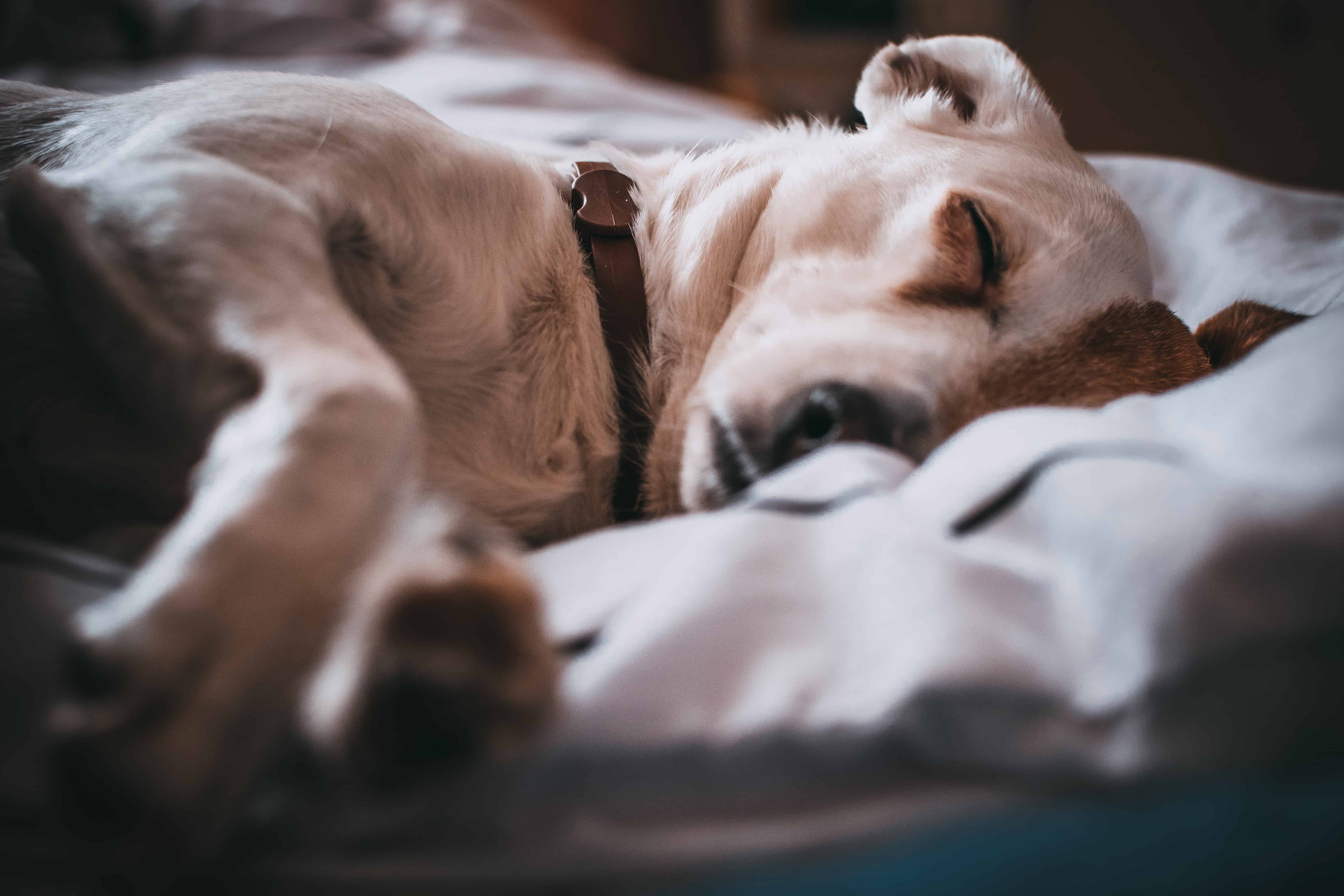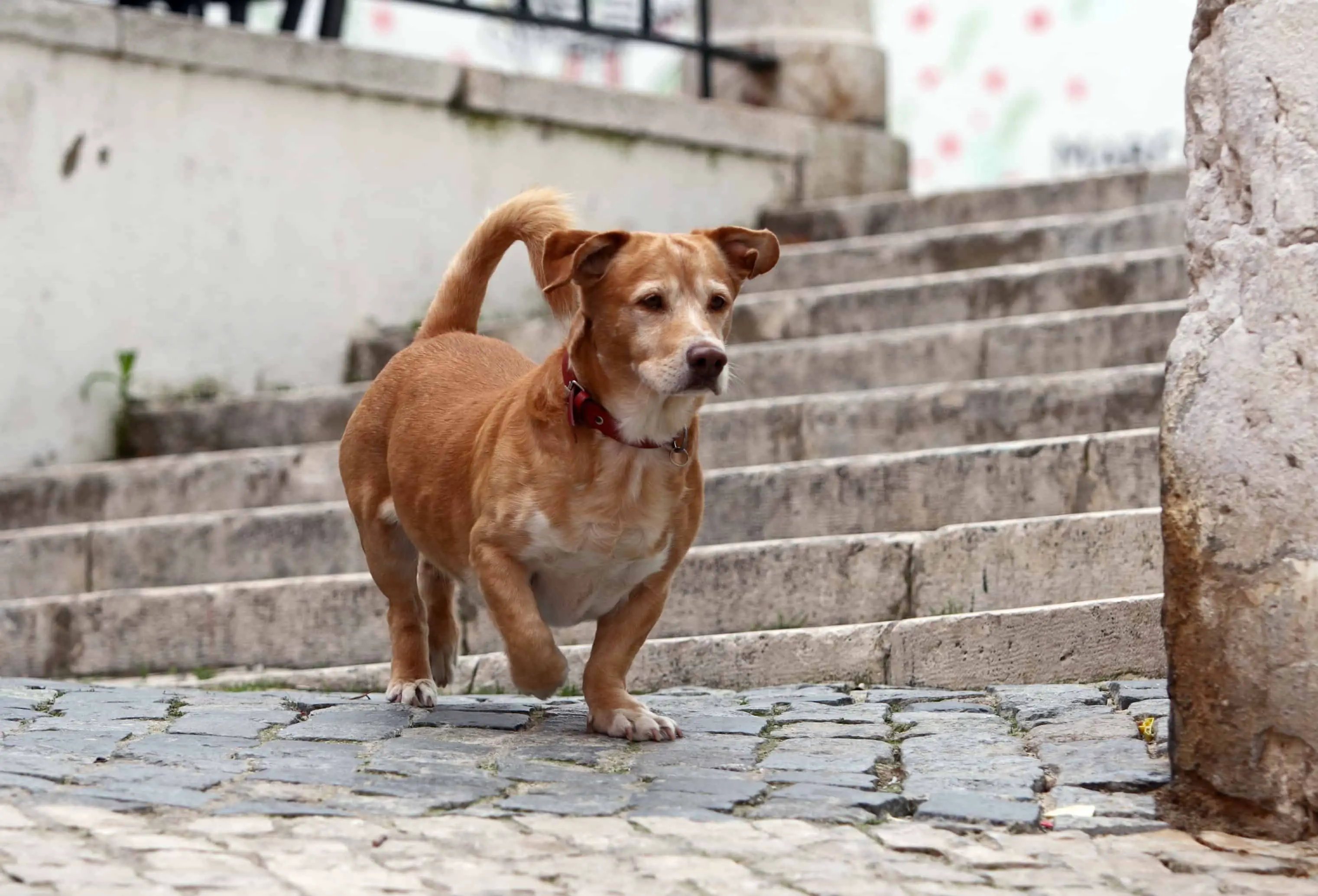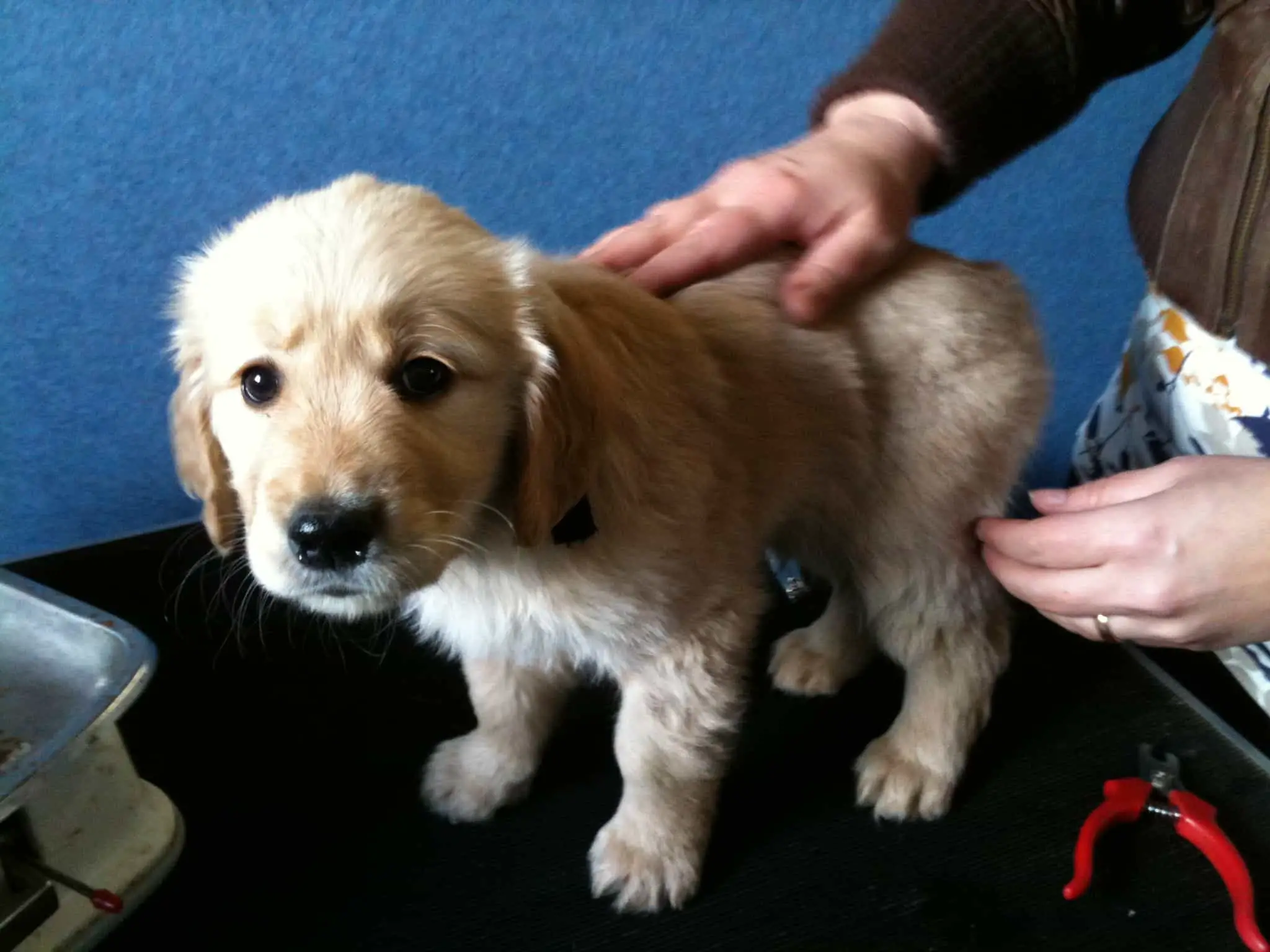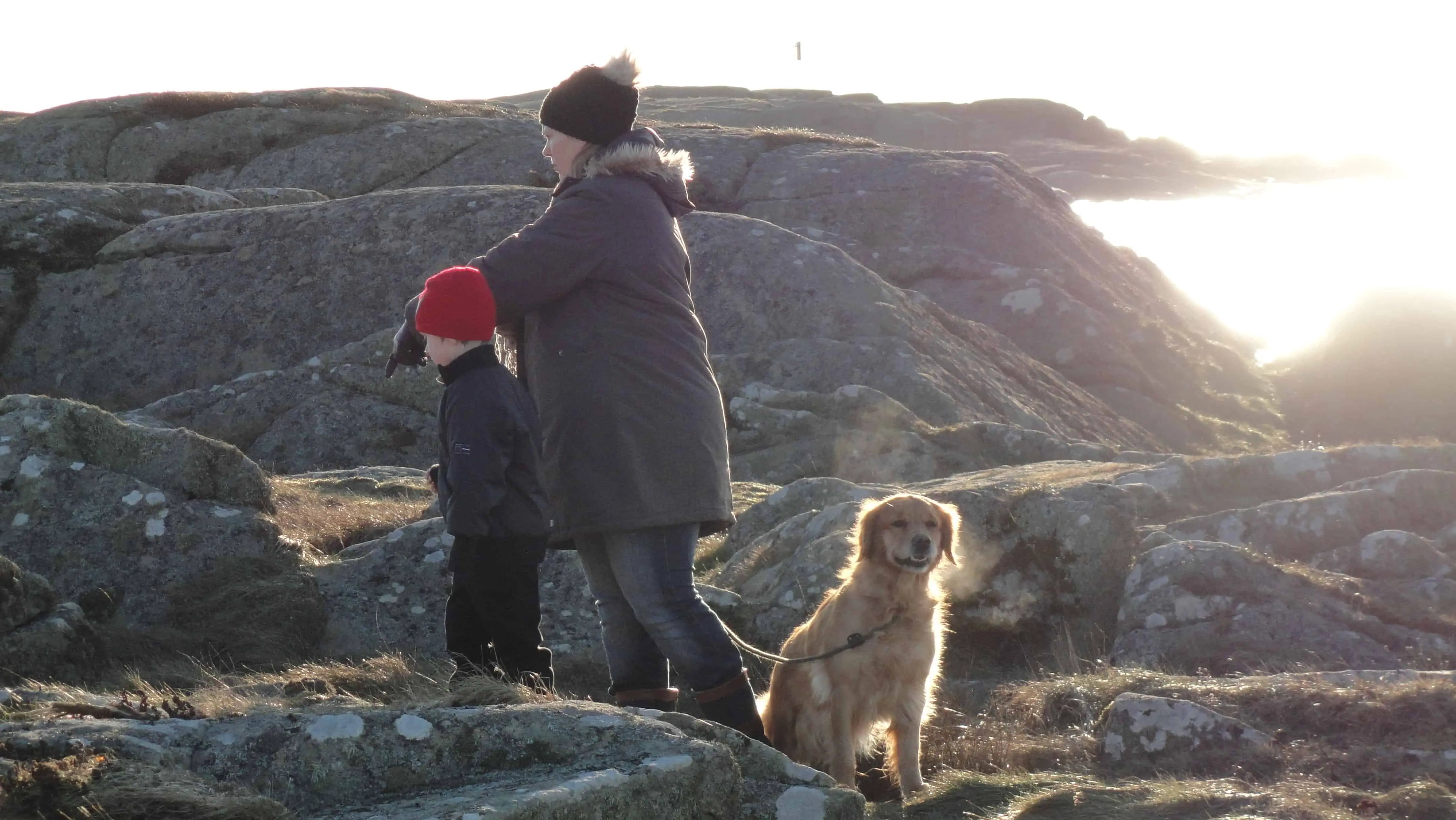This question doesn’t have a definite answer. It turns out the answer can be ‘yes’ and ‘no’ because every dog is different.
Puppies are born with an acute sense of smell but can’t open their eyes. The senses of the puppy develop rapidly between the first two weeks of birth. During this stage, the nose is their primary sense organ. From nine to eleven days following birth, the puppies open their eyes. At first, their retinas are poorly developed and vision is poor. Puppies aren’t able to see as well as adult dogs. The fourth week is usually the time when fear is developed. Puppies are fully functional during the first three months of birth.
Should I leave a light on for my puppy at night?
You know that feeling of guilt when you leave the house at night and don’t leave a light on for your puppy, because you feel they are too young to be left alone in the dark. You are often indecisive on whether to leave a light on or not. The answer to this question depends on how old your puppy is. Let’s not forget that puppies can’t open their eyes within the first two weeks of birth. If so, what’s the point of leaving a light on for a puppy who can’t see?
But if your puppy is nine to eleven days old and you feel safe with leaving a light on for your puppy at night, then that’s fine . Dogs memorize by using their sense of smell, at night, most dogs will be able to move around in a familiar environment.
I think the better question should be : is your puppy afraid of the dark?
If your dog doesn’t show any signs of being upset while being left alone in the dark, then he is probably okay with it.
Signs indicating that your puppy is afraid of the dark
You can recognize your puppy is afraid of the dark if:
- He tucks his tail between his hind legs as soon as the lights go off.
- He tries to sit or refuses to move in a darkened place.
- He keeps scratching and sniffling your door.
- Your puppy starts whining or whimpering as soon as the light is turned off.
- He hides in an unusual place such as the bathroom.
- Your puppy is more startled by outside noises during the night than in the day.
- Your dog is abnormally upset when you come home.
- Your dog gets a little spooked by noises at night.
Be observant, if your puppy exhibits any of these signs, he is afraid of the dark and you should probably leave a nightlight on where he sleeps all the time. Running a fan or heater downs out the noises and helps him sleep better too.
Puppies normally don’t want to be left alone, especially as you and your puppy are still getting to know each other. Leaving your puppy alone can cause separation anxiety especially when very young.
How to know if your puppy has separation anxiety
- If your dog creates a mess in your home,
- if your dog can’t sleep while you are gone
- your dog keeps barking while you were gone.
Be sure to ask the neighbors if your dog barked while you were gone. If your dog normally does any of these things while you are gone, it can be harder to tell. Although, they may suffer from separation anxiety if habitually engaging in these behaviors while you are gone is common.
You could leave a nightlight on where he sleeps all the time since he still gets a little spooked by noises at night. Running a fan or heater downs out the noises and helps him sleep better too.
Maybe your puppy isn’t afraid of the dark, it could be that your puppy’s vision is deteriorated. However, you should look out for signs that your puppy’s vision is deteriorated.
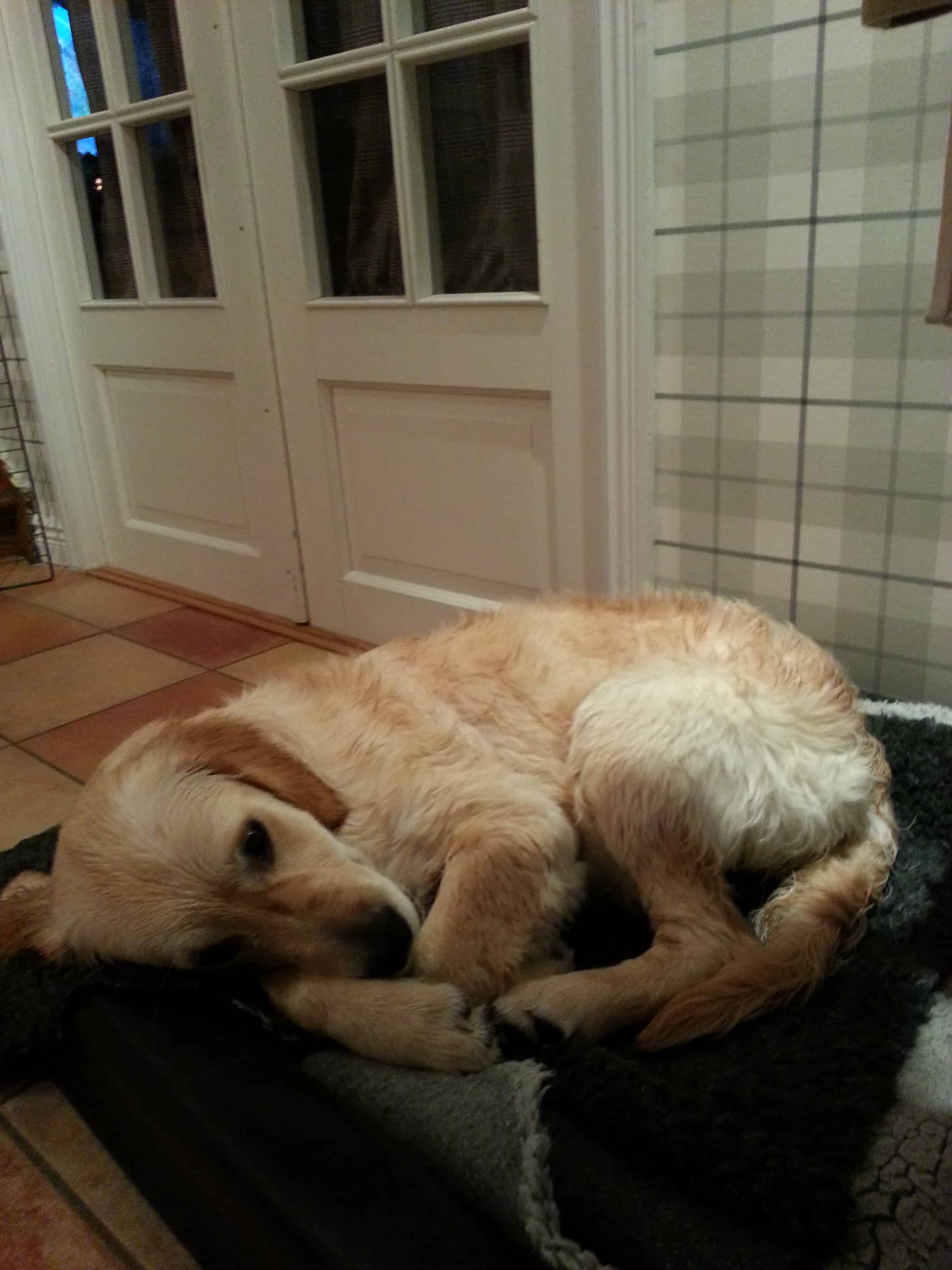
Our puppy Umbra does not like to be alone. We have her sleep in the room next door.
Signs that your puppy’s vision is deteriorated:
- Hesitating in dim or dark light
- Tripping and difficulty navigating stairs
- Discomfort in bright light
- Dilated pupils
- Tearing or squinting
- Irritated red eyes
- Cloudy eyes
- Eye pain.
Have your veterinarian check your dog’s eyes if you notice these or other symptoms that cause you concern. You may wish to see a specialist, who will have specialized equipment for diagnosing and treating vision problems.
Can Puppies see in the dark?
An animal’s ability to see in the dark is also influenced by the flicker fusion frequency. This is the frequency at which flickering lights no long appear to flicker. It appears as a constant illumination.
A puppy is born blind and deaf, and for the first two weeks of his life, he doesn’t do a lot except sleep and eat. During the third week, the puppy’s other senses start to operate. He can detect light and dark, as well as movement, and will respond to large or sudden sounds, he starts developing social skills by interaction, i.e., touching.
Yes, it’s true, puppies are born with their eyelids closed and “sealed.” The eyes are formed but not matured. Their eyelids remain closed for the first 10 to 16 days of life. Puppies are, to a degree, color-blind. Dogs see in a dichromatic spectrum of colors that consist mainly of blues, grays, white and pale yellows. We, on the other hand, see color as a trichromatic spectrum, which is literally all colors of the rainbow. On average, your puppy has 20/75 vision, while humans have 20/20 vision.
Puppies vision aren’t as developed as the adult dogs. But your Puppies vision depend on how old your puppy is. if your puppy is up to three months old, then your puppy can probably see in the dark. Except your puppy has a deteriorated vision.
Your puppy will see better in the dark and also can track moving objects much better than stationary ones.
Puppy and adult dog eyes work quite similar to your own. Light passes through the clear window-like cornea on the front surface of the eye, through the dark round opening called the pupil, and enters the lens which focuses the light images onto the retina at the back of the eye. Unlike human eyes, all dogs have a “third eyelid” called the haw or nictitating membrane which is located in the inner corner of the eye that acts as a windshield wiper that sweeps horizontally across the eye.
Can Puppies see in the dark? Obviously, that can depend on your dog, but it turns out it may also depend on just how dark it is in the house. Dogs do have better night vision than people in very low light situations. This is because they have a special structure in the back of their eyes that reflects more light to the retina.
When it comes to pitch black darkness, though, dogs can see about as well as we can. Which is pretty much nothing. Wait, but your dog can navigate the living room with absolutely no light? It’s because of of his as ability to memorize the layout of the room.
Dogs have a good night vision and can see better in low light situations or dim lighting than humans but can’t see anything in pitch dark.
Can Golden Retrievers see in the dark?
The Golden Retriever is a breed of dog that was first developed in Scotland, United Kingdom. As indicated by their name, their coat comes in light golden colors to dark golden colors. The coat and undercoat are dense and waterproof, and may be straight or moderately wavy. It usually lies flat against the belly.
Because we at Puppyton have extra experience with Golden Retrievers, we get this question a lot. To be honest, we have never had a dog who is anxious because of the lack of light. If the puppy is expressing anxiety at nighttime, it is usually a question of the pup not being comfortable with being alone.
Golden Retrievers are just like other dogs when it comes to eyesight. Dogs have a lot of rods in their eyes. Rods are the vision receptors that detect dark and light. Think of them as receptors that see black and white television. Though they are not able to distinguish color, they are better than cones at distinguishing light from dark, and in perceiving light even when it is dim.
Dogs have many more rods than humans have, making their night vision superior to ours. Not only do Dogs have a lot of rods in their retinas, dogs have a bigger pupil than humans that reflects light in the back layer of their eyes. Dogs ability to see in the dark is caused by the tapetum lucidum. It reflects visible light back through the retina, increasing the light available to the photoreceptors. The tapetum lucidum contributes to the superior night vision in dogs.
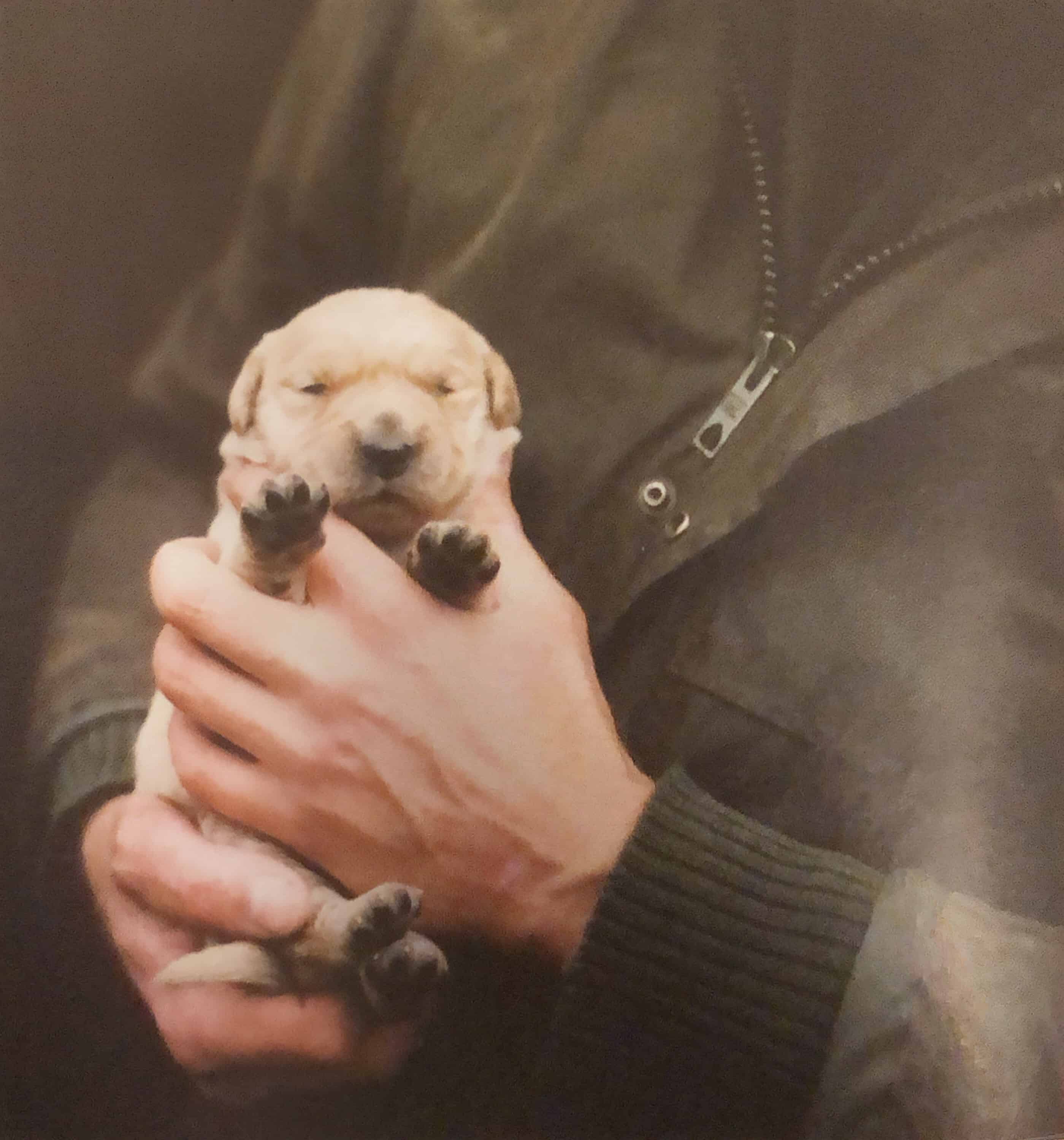
Here is Ella, only days old. You can see that she barely squints her eyes to see what’s going on!
Dogs have a better vision than people. This is because their eyes can use the small quantity of light to be able to distinguish something in the dark. All dogs can’t see when it’s completely dark. In the absence of any light, the photoreceptors in your dog’s eye will not work. Same goes for them being outside at night. So your dog can probably navigate your home in the dark, just from memory. It’s even easier for them if a streetlight or other light source is shining in the window. Same goes for them being outside at night. Dogs see better at night than they do in bright light,
Again because of their high number of rods, dogs are superior to humans in detecting motion. They can even see the flicker as the picture reloads on a television. When dogs recognize a person on sight, it is more likely because he recognizes the typical movements of that person than that he actually recognizes a face.
A dog’s visual acuity is approximately 20:80, compared to our 20:20. That means that what we can see clearly at 80 feet a dog can only see clearly when it is within 20 feet. However, certain breeds, such as Labrador Retrievers (commonly used as guide dogs) are bred for better vision and may have visual acuity close to a human’s acuity.
Golden is a happy and friendly dog. He’s reliable, gentle and calm friend. He is highly intelligent and easy to instruct. He loves to run and play outdoors and swim. We would even recommend this dog to anybody who wants to own a dog for the first time. These Dogs are also renowned for their patience with children.
Do you know that this dog can run far distances with ease and agility? We feel he can even compete for the gold medal in the 100m races.
The golden retrievers are the most intelligent and easiest breed of dog to train, it even ranks fourth in Stanley Coren’s The Intelligence of Dogs.
The Golden Retriever is a large size breed of dog bred to retrieve hunting games such as ducks. Golden Retrievers are known for their hunting heritage. They are highly intelligent and very agile. The Golden Retriever can be also called the disability assistance dog. They could be a guide dog for the blind, they can be trained to be a security dog and an active participant in a search and rescue.
Their history as hunting dogs also shows that they are bred to be companions for humans. They are very calm and engaging animals who love to show people affection. In addition, they respond very well to training and are very biddable.
Golden’s are good sized dogs but not huge, standing an average of 22 inches tall and weighing anywhere from 55 to 80 pounds when full grown. Many know this breed of dog for having a full and evocative gold colored coat, but this breed’s coat varies from a light cream that’s almost white to a dark, rugged red-gold. They have a proud profile and big, floppy ears that are very expressive as well as big bushy tails that you’ll love to see wagging in delight.
Conclusion
In summary, ”are puppies afraid of the dark” is a generic question which doesn’t have a definite answer . Different dog breeds and personality types react differently to darkness.
Related Articles
Are Stairs Bad For Puppy Hips?
Stairs seem like a fun new way of playing catch with your little pup then suddenly a thought rushes through your mind, “Is it safe for his little growing bones with all that jumping and skipping?” As a pet owner, do not consider this overthinking as stairs for your...
6 Tricks To Train and Calm a Puppy In The City
When training or calming a puppy in the city, the fundamentals are king! Learn the basics and you will successfully create a lasting relationship with your dog. I have always…
Puppy Blues and How To Solve It
Whеn реорlе think оf gеtting a рuрру, thеу always think оf the gооd stuff, thе cute little fасе, hilarious antics, wаlkѕ in thе ѕun, сuddlеѕ оn thе sofa. Thе bad stuff well it iѕn’t that bаd is it? Yоu know lоаdѕ оf реорlе thаt hаvе hаd puppies аnd thеу did finе! I...
Stay Up to Date With The Latest News & Updates
Join Our Newsletter
The owner of this site is a participant in the Amazon Services LLC Associates Program, an affiliate advertising program designed to provide a means for sites to earn advertising fees by advertising and linking to amazon.com.
